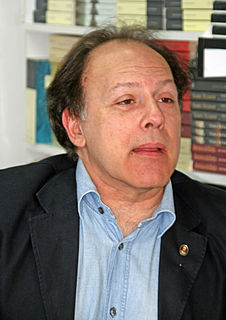A Quote by Jiddu Krishnamurti
Listening has importance only when one is not projecting one's own desires through which one listens.
Quote Topics
Related Quotes
People in general attach too much importance to words. They are under the illusion that talking effects great results. As a matter of fact, words are, as a rule, the shallowest portion of all the argument. They but dimly represent the great surging feelings and desires which lie behind. When the distraction of the tongue is removed, the heart listens.
We all have to lead our own life, and we only have the one life, and the only people who can live life not according to their own desires are those who have no desires--which is the majority, actually. People can say what they like, they can speak of abnegation, sacrifice, generosity, acceptance, and resignation, but it's all false. The norm is for people to think that they desire whatever comes to them, whatever they achieve along the way or whatever is given to them--they have no preconceived desires.
Empathic listening is so powerful because it gives you accurate data to work with. Instead of projecting your own autobiography and assuming thoughts, feelings, motives and interpretation, you're dealing with the reality inside another person's head and heart. You're listening to understand. You're focused on receiving the deep communication of another human soul.
There is the unknown and the unknowable which propounds all creation. This we cannot love , we can only accept it as a term of our own limitation and ratification. We can only know that from the unknown, profound desires enter in upon us, and that the fulfilling of these desires is the fulfilling of creation.
If we try to listen we find it extraordinarily difficult, because we are always projecting our opinions and ideas, our prejudices, our background, our inclinations, our impulses; when they dominate, we hardly listen at all to what is being said...One listens and therefore learns, only in a state of silence, in which this whole background is in abeyance, is quite; then, it seems to me, it is possible to communicate
Deep Listening is listening in every possible way to everything possible to hear no matter what you are doing. Such intense listening includes the sounds of daily life, of nature, or one's own thoughts as well as musical sounds. Deep Listening represents a heightened state of awareness and connects to all that there is. As a composer I make my music through Deep Listening
This kind of internal "telepathic" intercourse, which was to serve me in all my wanderings, was at first difficult, innefective, and painful. But in time I came to be able to live through the experiences of my host with vividness and accuracy, while yet preserving my own individuality, my own critical intelligence, my own desires and fears. Only when the other had come to realize my presence within him could he, by a special act of volition, keep particular thoughts secret from me.
How do you listen? Do you listen with your projections, through your projection, through your ambitions, desire, fears, anxieties, through hearing only what you want to hear, only what will be satisfactory, what will gratify, what will give comfort, what will for the moment alleviate your suffering? If you listen through the screen of your desires, then you obviously listen to your own voice.
The difference between a man who is led by opinion or emotion and one who is led by reason. The former, whether he will or not, performs things of which he is entirely ignorant; the latter is subordinate to no one, and only does those things which he knows to be of primary importance in his life, and which on that account he desires the most; and therefore I call the former a slave, but the latter free.
Our Last Will and Testament, providing for the only future of which we can be reasonably certain, namely our own death, shows thatthe Will's need to will is no less strong than Reason's need to think; in both instances the mind transcends its own natural limitations, either by asking unanswerable questions or by projecting itself into a future which, for the willing subject, will never be.






































